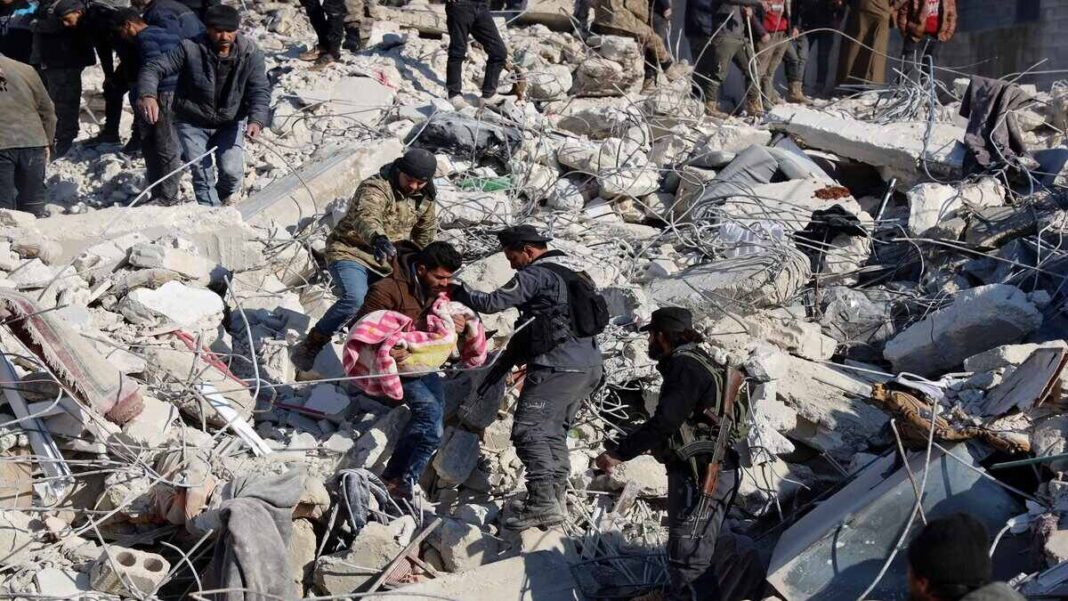TURKEY/SYRIA: The death toll from the earthquakes that shook Turkey and Syria earlier this week surpassed 17,000 on Thursday, while hopes fade for many who were found alive after 72 hours of the disaster amid the ruins of cities.
Millions affected in Turkey-Syria earthquake
A Turkish official stated that the catastrophe posed “extremely serious difficulties” for the election, which was scheduled for May 14, in which President Tayyip Erdogan was anticipated to face the toughest challenge in his 20 years in office.
In Turkey and Syria, a large number of people spent a third night sleeping outside or in automobiles in the frigid winter weather since their homes had been demolished or they were so shaken by the earthquakes that they were too terrified to reenter. Hundreds of thousands of people are now homeless in the middle of the winter.
The number of fatalities caused by the quake, which occurred in the middle of the night and was followed by strong aftershocks, is on course to be higher than in 1999, when a similar strong quake killed 17,000 people in Turkey’s more densely populated northwest.
A video of a few more survivors being rescued in Turkey surfaced late on Wednesday. One of them was Abdulalim Muaini, who was taken from his collapsed home in Hatay, Turkey, where he had been staying since Monday next to his dead wife.
77 hours after the initial earthquake, rescuers extricated Meral Nakir, 60, from the wreckage of an apartment building in Malatya, a media official broadcaster reported live on Thursday.
By Thursday morning, the death toll in Turkey had risen to 12,873. As per the government and a rescue organisation in the rebel-held northwest of Syria, where nearly 12 years of civil war have already wreaked havoc, more than 3,000 people have died.
A resident of Syria, Ibrahim Khalil Menkaween, was seen walking through the debris-strewn streets of the ruined Syrian village of Jandaris while carrying a folded white body bag. He stated he had lost seven family members, including his wife and two brothers.
“I’m holding onto this bag so that we can pack up my brother, my brother’s little boy, and both of their spouses when they bring them out,” he stated. On Thursday, humanitarian workers want to use a bridge that has been closed since the earthquake to carry aid into northwest Syria from Turkey.
Many people in Turkey have voiced their dissatisfaction about the lack of resources, knowledge, and assistance available to free individuals who are trapped, sometimes even while they could hear screams for assistance.
The main road into the Turkish city of Antakya was congested with traffic as locals, who had finally found scarce gasoline, tried to flee the disaster zone, and relief vehicles proceeded into the area, further hampering the rescue operation.
People sorted through cardboard boxes of clothing donations left at a service station close to the town of Kemalpasa.
On a visit to the disaster area on Wednesday, Erdogan said that operations were now running regularly and made a commitment that no one would be left without a place to live after receiving criticism for the reaction.
15% of Turks lived in the impacted area, the Turkish official told the media, making it premature to talk about elections at this time. “At the moment, there are very serious difficulties in holding an election on May 14,” as had been planned, he stated.
People have searched for temporary shelter and food in the icy winter weather throughout a large area of southern Turkey, and they have waited in agony near rubble mounds where loved ones may still lie buried.
A senior UN official in Syria, El-Mostafa Benlamlih, estimated that 10.9 million people in the northwest governorates of Hama, Latakia, Idlib, Aleppo, and Tartus had been impacted by the disaster.
Turkish officials said that about 13.5 million people were impacted over a distance of about 450 kilometres (280 miles) from Adana in the west to Diyarbakir in the east. As far south as Hama, about 250 km from the epicentre, people were killed in Syria.
On Wednesday, Erdogan visited Kahramanmaras, saying there had been initial issues with roads and airports but “we are better today.” Erdogan had proclaimed a state of emergency in ten districts and dispatched troops to assist. However, the catastrophe will give the incumbent president more of a challenge in the election.
Any sense that the administration is not effectively handling the tragedy could be detrimental to his prospects. On the other hand, analysts contend that he might strengthen his position by mobilising national support around the crisis response.
Twitter was briefly blocked in Turkey on Wednesday, just as users had begun to “rely on the service” in the wake of the disaster, said the Netblocks internet observatory.
Also Read: Iranian Prosecutors Hide Rape by Revolutionary Guards



